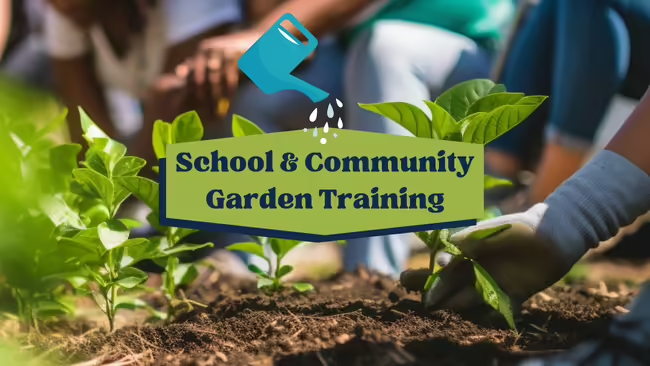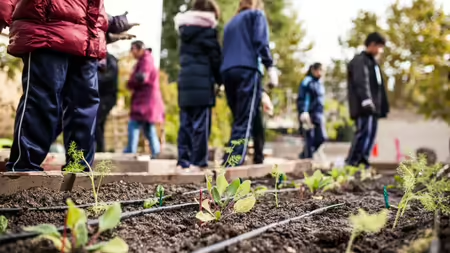
This three-part, free training series will help you gain the knowledge and confidence to start your own school or community garden! All three sessions will be conducted over Zoom.
All audiences are welcome and encouraged to attend this free program, but technical assistance is available only to garden sites in Cook County, IL. You may choose to attend one, two, or all three sessions. Keep reading below for a summary of all three sessions. Attendance at all three sessions is highly recommended for new gardens that are requesting on-site assistance from Illinois Extension in Cook County. Registration is free but required.
Priority for scheduling on-site technical assistance will be given to garden teams who attend the full training series. We ask that at least three representatives (may include staff, volunteers, parents, teachers, garden coordinators, administrators) from your garden attend the training series to jump-start planning, recruit helpers, schedule garden installations and develop programming.
2024 Lineup:
Thursday, February 15th from 6 to 8 PM - Introduction, Getting Started, and Volunteer Engagement
- Introduction: Learn about Illinois Extension in Cook County programming and meet Extension staff that will help you make connections with local organizations and resources. Information will be shared on various garden grants along with developing relationships with garden supporters in Cook County. Our Master Gardener and Master Naturalist coordinators will provide information on how our Extension volunteers can also provide hands-on support and consultation.
- Forming and Leading a School or Community Garden: Local Foods Systems and Small Farms Educator Kathryn Pereira and Horticulture Educator Nancy Kreith will walk you through the steps of forming and leading a school or community garden. Topics will include determining your garden’s purpose, recruiting volunteers, how to select and prepare a site, how to set rules and guidelines, and best practices for critical processes for communications, meetings, and planning. Real-life case studies will be used to illustrate garden success and setbacks.
- Garden Volunteer Engagement: Have you ever found yourself with too few volunteers on a garden workday? Does it seem like the same people do all the work? Do parents tell you their kids love the school garden program, but they never contribute? How do we as garden leaders overcome these hurdles? Local Food Systems and Small Farms educator Kathryn Pereira, a founding member of Quann Community Garden (est. 2001) in Madison Wisconsin, will present some common problems and solutions she’s seen work followed by a roundtable discussion where you can present your problems and share your solutions to learn new tips, tricks, and tools create a thriving volunteer culture.
Thursday, February 22nd from 6 to 8 PM - Vegetable Gardening
- Basic Vegetable Gardening: Horticulture Educator Nancy Kreith will cover basics of vegetable gardening. Topics include soil and bed preparation, soil testing, raised bed construction, seed starting and various growing techniques.
- Advanced Vegetable Gardening: Local Food Systems and Small Farms Educator Zack Grant will deliver ideas for extending the season during the winter months along with best harvesting practices. This session will cover harvesting and storage methods, food safety and season extension.
Thursday, February 29th from 6 to 8 PM - Ornamental Gardens and Curriculum
- Ornamental Plants, Native Plants and Conservation@Home: Horticulture Educator Gemini Bhalsod will provide an overview of ornamental plants, including native plants, and why they are a beneficial addition to your garden, how to select species, and how to care for them. A brief overview of the Conservation@Home program, which has resources for gardening using environmentally-friendly practices and educational opportunities, will also be provided.
- Incorporating Educational Opportunities: STEM Educator Amy Morton will offer an overview of how to incorporate educational opportunities into your garden. She will cover how to connect garden activities to STEM curriculum and the Next Generation Science Standards.
